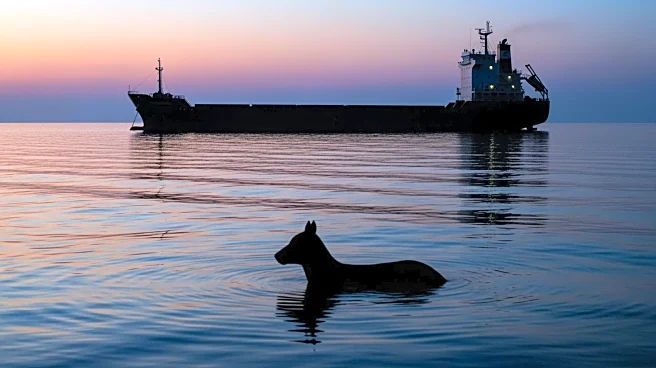What's Happening?
The livestock carrier Spiridon II, which was stranded off the Turkish coast for over a month, has unloaded cattle in Benghazi, Libya, after a voyage from Uruguay with nearly 3,000 cattle on board. The Animal Welfare Foundation (AWF) has raised concerns
about the conditions on the vessel, citing extreme conditions due to the inability to unload, clean, or properly dispose of carcasses. The AWF reports that dozens of animals died, and many calves were born, lost, or perished during the journey. The vessel's AIS signal was reportedly turned off several times, and white sacks presumed to contain carcasses disappeared by November 23. AWF is calling for an international investigation by the World Organization for Animal Health and the International Maritime Organization (IMO) into possible MARPOL violations and the welfare of the animals. The timeline of events includes the vessel's departure from Uruguay on September 20, 2025, and its arrival in Türkiye on October 22, where unloading was refused due to discrepancies in ear tags. The vessel eventually docked in Benghazi on November 22, with satellite images showing trucks in front of the vessel.
Why It's Important?
The situation with the Spiridon II highlights significant concerns regarding animal welfare and maritime regulations. The inability to properly manage the livestock on board raises questions about the enforcement of international regulations like MARPOL, which prohibits the disposal of waste in the Mediterranean Sea. The AWF's call for an investigation underscores the need for accountability and transparency in the live animal trade by sea. This incident could lead to increased scrutiny of maritime practices and pressure on regulatory bodies to enforce stricter guidelines to prevent similar occurrences. The welfare of animals during transport is a critical issue that affects international trade relations and ethical standards in the industry.
What's Next?
The AWF's demand for an investigation could prompt action from international regulatory bodies, potentially leading to changes in how live animal transport is monitored and regulated. If the investigation reveals violations, it may result in penalties for those responsible and stricter enforcement of existing regulations. The incident may also influence policy discussions on animal welfare and maritime practices, encouraging stakeholders to adopt more humane and environmentally responsible methods. The outcome of the investigation could impact future trade agreements and the reputation of countries involved in the live animal trade.
Beyond the Headlines
The Spiridon II case sheds light on the broader ethical implications of the live animal trade, particularly the challenges in balancing economic interests with animal welfare. The incident may spark debates on the sustainability and morality of transporting large numbers of animals over long distances. It also raises questions about the adequacy of current regulations and the need for more comprehensive oversight to protect animal welfare and marine environments. The case could lead to increased advocacy for alternative methods of livestock management and transport, promoting more humane practices in the industry.
















